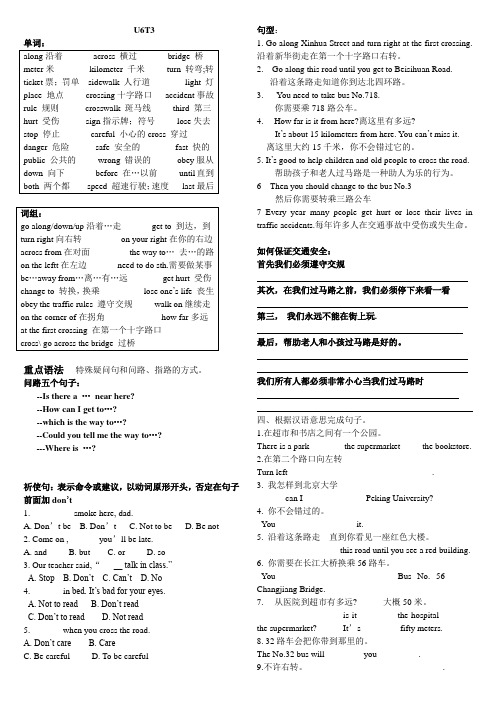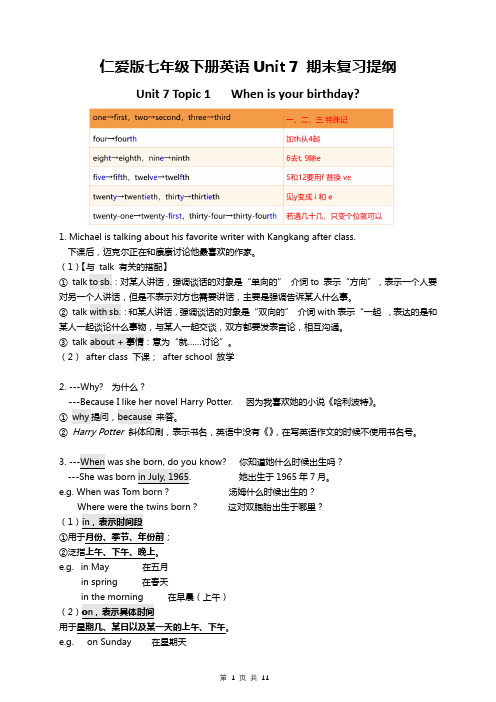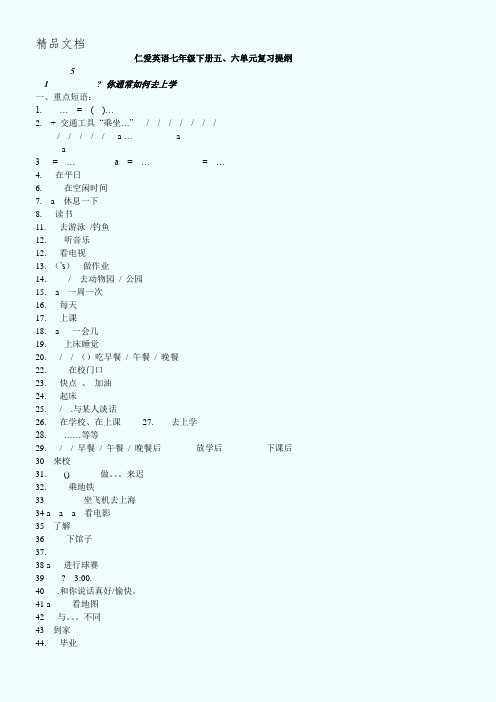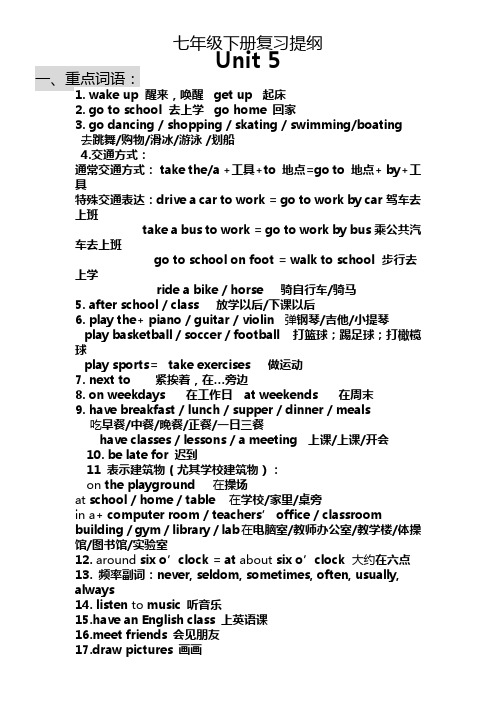仁爱英语七年级下册复习提纲
- 格式:doc
- 大小:80.50 KB
- 文档页数:9

U6T3重点语法特殊疑问句和问路、指路的方式。
问路五个句子:--Is there a …near here?--How can I get to…?--which is the way to…?--Could you tell me the way to…?---Where is …?祈使句:表示命令或建议,以动词原形开头,否定在句子前面加don’t1. _________ smoke here, dad.A. Don’t beB. Don’tC. Not to beD. Be not2. Come on , ______ you’ll be late.A. andB. butC. orD. so3. Our teacher said,“_____ talk in class.”A. StopB. Don’tC. Can’tD. No4. _______in bed. It’s bad for your eyes.A. Not to readB. Don’t readC. Don’t to readD. Not read5. _______when you cross the road.A. Don’t careB. CareC. Be carefulD. To be careful 句型:1. Go along Xinhua Street and turn right at the first crossing. 沿着新华街走在第一个十字路口右转。
2. Go along this road until you get to Beisihuan Road.沿着这条路走知道你到达北四环路。
3. You need to take bus No.718.你需要乘718路公车。
4. ---How far is it from here?离这里有多远?---It’s about 15 kilometers from here. You can’t miss it.离这里大约15千米,你不会错过它的。

仁爱版七年级下册英语Unit 7 期末复习提纲Unit 7 Topic 1 When is your birthday?1. Michael is talking about his favorite writer with Kangkang after class.下课后,迈克尔正在和康康讨论他最喜欢的作家。
(1)【与talk 有关的搭配】①talk to sb.:对某人讲话,强调谈话的对象是“单向的” 介词to 表示“方向”,表示一个人要对另一个人讲话,但是不表示对方也需要讲话,主要是强调告诉某人什么事。
②talk with sb.:和某人讲话,强调谈话的对象是“双向的” 介词with表示“一起,表达的是和某人一起谈论什么事物,与某人一起交谈,双方都要发表言论,相互沟通。
③talk about + 事情:意为“就……讨论”。
(2)after class 下课;after school 放学2. ---Why? 为什么?---Because I like her novel Harry Potter. 因为我喜欢她的小说《哈利波特》。
①why提问,because 来答。
②Harry Potter斜体印刷,表示书名,英语中没有《》,在写英语作文的时候不使用书名号。
3. ---When was she born, do you know? 你知道她什么时候出生吗?---She was born in July, 1965. 她出生于1965年7月。
e.g. When was Tom born?汤姆什么时候出生的??这对双胞胎出生于哪里?(1)in,表示时间段①用于月份、季节、年份前;②泛指上午、下午、晚上。
e.g. in May 在五月in spring 在春天在早晨(上午)(2)on,表示具体时间用于星期几、某日以及某一天的上午、下午。
on the morning of October 13th 在10月13日的上午4. ---When is your birthday, Kangkang? 康康,你的生日是什么时候?---May 13th. 5月13日。

仁爱英语七年级下册五、六单元复习提纲51 ? 你通常如何去上学一、重点短语:1. … = ( )…2. + 交通工具“乘坐…” / / / / / / // / / / / a … aa3 = … a = … = …4. 在平日6. 在空闲时间7. a 休息一下8. 读书11. 去游泳/钓鱼12. 听音乐12. 看电视13. (’s)做作业14. / 去动物园/ 公园15. a 一周一次16. 每天17. 上课18. a 一会儿19. 上床睡觉20. / / ()吃早餐/ 午餐/ 晚餐22. 在校门口23. 快点、加油24. 起床25. / .与某人谈话26. 在学校、在上课27. 去上学28. ……等等29. / / 早餐/ 午餐/ 晚餐后放学后下课后30 来校31. () 做。
来迟32. 乘地铁33 坐飞机去上海34 a a a 看电影35 了解36 下馆子37.38 a 进行球赛39 ? 3:00.40 .和你说话真好/愉快。
41 a 看地图42 与。
不同43 到家44. 毕业二、语法:(练习10题)表时间频率的副词:从来不极少经常常常总是(系动词之后,行为动词之前)有时(系动词之后,行为动词之前,也可放句首,放句末用逗号隔开。
)★100﹪表示“总是;一直;始终”。
如: . 他总是迟到。
★90﹪表示“通常,经常”。
如:I 10:00. 我通常10点钟睡觉。
★70﹪表示“常常,经常”。
如: . 他们常常在放学后打扫教室。
★40﹪表示“有时,不时”。
如: . 冬天我们有时去滑雪。
★5﹪表示“几乎从不;很少;难得”。
如:o’.★0﹪表示“几乎从不;很少;难得”。
如:o’.三、重要句型:1. ! .2. . .3. ? / / . .4. ’s . = ’s . 该是上课的时候了。
5. . 笨鸟先飞。
/ 捷足先登。
6. . 我们没有更多的时间了。
7. I .我早上上四节课,下午上两节。
8. a . 她九点四十五分睡觉。

仁爱英语七年级下册五、六单元复习提纲 Unit 5 Our School LifeTopic1 How do you usually come to school ? 你通常如何去上学一、重点短语:1. on foot go …on foot = walk ( to )…2. by + 交通工具“乘坐…” by bus / bike / plane / train / subway / ship / boat / carby bus / bike / plane / train / subway / ship =on a bus/…by car= in a carby plane=by air=on a plane3.take the bus = go …by bus ride a bike = go …by bike take the subway = go …by subway4. on weekdays 在平日6. in their free time 在空闲时间7. have a rest 休息一下8. read books 读书11. go swimming/fishing 去游泳/钓鱼12. listen to music 听音乐12. watch TV 看电视13. do(one’s)homework 做作业14. go to the zoo / park 去动物园/ 公园15. once a week 一周一次16. every day 每天17. have classes 上课18. for a little while 一会儿19. go to bed 上床睡觉20. have breakfast / lunch / supper(dinner)吃早餐/ 午餐/ 晚餐22. at the school gate 在校门口23. come on 快点、加油24. get up 起床25. talk with / to sb.与某人谈话26. at school 在学校、在上课27. go to school 去上学28. and so on ……等等29. after breakfast / lunch / supper早餐/ 午餐/ 晚餐后after school 放学后after class 下课后e to school来校31. be late for (doing) sth 做。

七年级下册复习提纲Unit 5一、重点词语:1. wake up 醒来,唤醒 get up 起床2. go to school 去上学 go home 回家3. go dancing / shopping / skating / swimming/boating去跳舞/购物/滑冰/游泳 /划船4.交通方式:通常交通方式: take the/a +工具+to 地点=go to 地点+ by+工具特殊交通表达:drive a car to work = go to work by car 驾车去上班take a bus to work = go to work by bus 乘公共汽车去上班go to school on foot = walk to school 步行去上学ride a bike / horse 骑自行车/骑马5. after school / class 放学以后/下课以后6. play the+ piano / guitar / violin 弹钢琴/吉他/小提琴play basketball / soccer / football 打篮球;踢足球;打橄榄球play sports= take exercises 做运动7. next to 紧挨着,在…旁边8. on weekdays 在工作日at weekends 在周末9. have breakfast / lunch / supper / dinner / meals吃早餐/中餐/晚餐/正餐/一日三餐have classes / lessons / a meeting 上课/上课/开会10. be late for 迟到11 表示建筑物(尤其学校建筑物):on the playground 在操场at school / home / table 在学校/家里/桌旁in a+ computer room / teachers’ office / classroombuilding / gym / library / lab在电脑室/教师办公室/教学楼/体操馆/图书馆/实验室12. around six o’clock = at about six o’clock大约在六点13. 频率副词:never, seldom, sometimes, often, usually,always14. listen to music 听音乐15.have an English class 上英语课16.meet friends 会见朋友17.draw pictures 画画18.work on math problems 解答数学题19. do outdoor activities 进行户外活动20. every week 每周each day 每天three times a week 每周三次21. from…to…从…到…22. do one’s homework 做家庭作业23. like doing something = love doing something 喜欢做某事24.. a student of G rade O ne 一年级的学生25. eat out 出去吃26. get home 到家27. between… and… 在…与…之间28. most of them 他们大多数each of them 他们中的每一个29. get home 到家30. and so on 等等31. on time 按时32. Here it is. = Here you are. 给你33. learn…from 向…学习34.be over 结束35.be boring无聊的36.Lost and Found失物招领37.see a movie看电影38. be kind to sb对某人友好39.a few+名词复数一些……a little +不可数名词一些……反义词:first – last borrow – return / give back end –begineasy—hardinteresting—boring lost—foundbegin – finish difficult – easy boring –interesting名词单数转化复数:life – lives shelf – shelves leaf –leaveshalf–halves child—children二、重点句型:1.Happy New Year! The same to you! 新年快乐!也祝你新年快乐!2.She goes to bed at about a quarter to ten.她上床睡觉在约九点五十。

仁爱版英语七年级下册知识点复习归纳(完整版)Ren'ai English Grade 7 Unit 5 Topic 1 ReviewKey Grammar: Present Simple Tense (often used with adverbs of frequency such as never。
seldom。
sometimes。
often。
usually。
always)Key XXX:How do you usually come to school?I usually come to school by subway.How often do you go to the library?XXX/Three times a week/Very often/Every day/SeldomXXX:1.I always come to school by bus。
"By" is used with the name of a n method。
without any articles in een。
If there is an article such as "a," "the," or "my" in front of the n method。
"in" or "on" should be used instead。
For example。
"on the train" is the same as "by train," "on his bike" is the same as "by bike," and "inmy car" is the same as "by car." To distinguish een "on foot" and "walk," "on foot" means "walking" XXX but only as an adverb of manner at the end of a sentence。
仁爱版七年级下册英语复习知识点仁爱版七年级下册英语复习知识1重点语法Therebe句型Wh-questions重点句型What’syourhomelike?What’sthematter?Sorry,Ican’thearyou.I’llgetsomeonetocheckitrightnow.Thereissomethingwrongwithmykitchenfan.重点讲解housewiththreebedrooms.有三间卧室的房子。
with“有,带有”。
with还可以意为“和(某人/某物)在一起”apartmentforafamilyoftwo.适合两口之家的公寓。
(1)for表示“给……”表示目的或功能。
后接物主代词或名词,但通常带’s.或者后接表示无生命物体的名词。
Hereisaletterforyou.(2)of的含义为“属于某人/某事物”。
SheisafriendofLily’s.=SheisLily’sfriend.3What’sthematter?怎么了?该句常用来询问某或某物出了什么什么问题或毛病;询问具体某人或某物出了什么问题时,还可以表达为:What’sthematterwithsb./sth.某人或某物出了什么毛病。
What’sthematter?=What’swrong?Ihearyouplayingthepiano.我听见你在弹钢琴。
hear…doingsth.“听见……在做某事”,强调正在进行的动作。
hear…dosth.“听见……做了某事”,强调全过程。
hearaboutsth.听到关于某事物的消息hearfromsb.接到某人的来信、电话等hearofsb./sth.听到或知道某人或某事物的情况alotof=lotsof许多后接可数名词,相当于many;后接不可数名词,相当于much,用于肯定句中;但是注意:如果是否定句,则常用many或much.befarfrom…离……远(抽象距离)be…awayfrom…离……远(具体距离)Myschoolisnotfarfromthebookstore.Theseais2milesawayfromthehotel.7Thereissomethi ngwrongwithsb./sth.某人或某物出问题/有毛病了。
七年级英语(仁爱版)下册复习提纲七年级英语(仁爱版)下册复习提纲Unit 5 Our School Life一、任务形学习目标:1. 掌握并能熟练运用表达交通方式的句型。
2. 掌握频度副词的表达方式。
3. 掌握一般现在是的用法。
Topic 1二.重点短语:1. on foot go …on foot = walk ( to )…2. by + 交通工具“乘坐…” by bus / bike / plane / train / subway / ship / boat / car3.take the bus = go …by bus ride a bike = go …by bike ta ke the subway = go …by subway4. on weekdays 在平日5. after school 放学后 after class 下课后 after breakfast / lunch / supper早餐 / 午餐 / 晚餐后6. in their free time 在空闲时间7. have a rest 休息一下8. read books 读书 11. go swimming 去游泳 12. listen to music 听音乐 12. watch TV 看电视 13. do (one’s) homework 做作业 14. go to the zoo / park 去动物园 / 公园 15. once a week 一周一次 16. every day 每天 17. have classes 上课 18. for a little while 一会儿 19. go to bed 上床睡觉 20. have breakfast / lunch / supper(dinner)吃早餐 / 午餐 / 晚餐 22. at the school gate 在校门口 23. come on 快点、加油 24. get up 起床 25. talk with / to sb.与某人谈话 26. at school 在学校、在上课 27. go to school 去上学 28. and so on ……等等三.语法:表时间频率的副词:never 从来不 seldom 极少 sometimes 有时 often 经常 usually 常常 always 总是1. I never go to school by subway.2. I seldom walk to school.3. Maria sometimes takes the subway home.4. Li Xiang o ften rides a bike to school.5. We usually go to the park on foot.6. They always go to the zoo by bus.7. How often do you come to the library ? Very often / Twice a week / Once a week / Every day.四. 重要句型1. Happy New Year! The same to you.浏览完整试题2. Your new bike looks very nice. Thank you.3. How do you usually come to school ? By bus / car / bi ke. On foot.4. It’s time for class. = It’s time to have class. 该是上课的时候了。
七年级下册英语复习提纲(仁爱版)Unit 4 I want to be an actor.一.短语:1 want to do sth 想要做某事want to be…. 想要成为….2 give sb sth = give sth to sb 给某人某物 / 把某物给某人3 help sb do sth 协助某人作某事 Eg: I want to help my mother do some housework at home.4 help sb with sth 协助某人谋事 Eg: I want to help my mother with some housework at home5 in the day 在白天6 at night 在晚上get…from… 从….处取得….7 talk with/ to sb 和----谈话 talk about sb/sth 谈论某人/某事8 in a hospital 在医院l9 be busy doing sth 忙于做某事 Eg: He is busy listening to the teacher.10 work/ study hard 努力工作 11 Evening Newspaper 晚报11. work with… 和…打交道;跟…一起工作 12. go out 外出13. like doing/to do sth 喜欢做某事二.重点句式及注意事项:1 询问职业的特殊疑问词是what;有三种主要句式① What + is / are + sb? ② What + does/ do + sb + do?③ What + is/ are + 名词所有格/ 形容词性物主代词 + job?2 People give me their money or get their money from me.3 Sometimes I work in the day and sometimes at night.4 I like talking to people.5 I work late. I’m very busy when people go out to dinners.6 Where does your sister work?7 then we have a job for you as a waiter.8 Do you want to work for a magazine? Then come and work for us as a reporter.9 Do you like to work evenings and weekends?10 We are an international school for children of 5-12.三.本单元中的名词复数。
仁爱版英语七年级下册知识点复习归纳仁爱版英语七年级下册知识点复习归纳(完整版)仁爱版英语七年级下册知识点归纳英语七年级下册知识点归纳Unit 5 Topic1重点语法一般现在时(常与频度副词never, seldom, sometimes, often,usually, always等连用)重点句型—How do you usually come to school?—I usually come to school by subway.—How often do you go to the library?—Once/Twice/Three times a week/Very often/Every day/Seldom重点详解1I always come to school by bus.by+交通工具名称,表示使用某种交通方式,中间不加限定词,如果交通工具前有a, the, my等限定词,就不能用by,而是用in或是on.on the train=by train on his bike=by bike in my car=by car.巧辩异同on foot与w alk on foot“走路”,是介词短语,不能作谓语,只作方式状语,位于句末。
walk“走路”,是动词,可以作谓语。
goto…onfoot= walk toI often go to school on foot. =I often walk to school.仁爱版英语七年级下册知识点复习归纳(完整版)同样,go to….bybike = ride a bike togoto….by car = drive a car togo to…by plane = fly togoto…b y bus = take a bus to2 Come on!It’stime for class. come on“快点,加油,来吧”。
It’stime for sth.“该做某事了”,与It’stime to do sth.意思一样。
七年级下册复习提纲Unit 5一、重点词语:1. wake up 醒来,唤醒 get up 起床2. go to school 去上学 go home 回家3. go dancing / shopping / skating / swimming/boating去跳舞/购物/滑冰/游泳 /划船4.交通方式:通常交通方式: take the/a +工具+to 地点=go to 地点+ by+工具特殊交通表达:drive a car to work = go to work by car 驾车去上班take a bus to work = go to work by bus 乘公共汽车去上班go to school on foot = walk to school 步行去上学ride a bike / horse 骑自行车/骑马5. after school / class 放学以后/下课以后6. play the+ piano / guitar / violin 弹钢琴/吉他/小提琴play basketball / soccer / football 打篮球;踢足球;打橄榄球play sports= take exercises 做运动7. next to 紧挨着,在…旁边8. on weekdays 在工作日at weekends 在周末9. have breakfast / lunch / supper / dinner / meals吃早餐/中餐/晚餐/正餐/一日三餐have classes / lessons / a meeting 上课/上课/开会10. be late for 迟到11 表示建筑物(尤其学校建筑物):on the playground 在操场at school / home / table 在学校/家里/桌旁in a+ computer room / teachers’ office / classroom building / gym / library / lab在电脑室/教师办公室/教学楼/体操馆/图书馆/实验室12. around six o’clock = at about six o’clock大约在六点13. 频率副词:never, seldom, sometimes, often, usually, always14. listen to music 听音乐15.have an English class 上英语课16.meet friends 会见朋友17.draw pictures 画画18.work on math problems 解答数学题19. do outdoor activities 进行户外活动20. every week 每周each day 每天three times a week 每周三次21. from…to…从…到…22. do one’s homework 做家庭作业23. like doing something = love doing something 喜欢做某事24.. a student of G rade O ne 一年级的学生25. eat out 出去吃26. get home 到家27. between… and… 在…与…之间28. most of them 他们大多数each of them 他们中的每一个29. get home 到家30. and so on 等等31. on time 按时32. Here it is. = Here you are. 给你33. learn…from 向…学习34.be over 结束35.be boring无聊的36.Lost and Found失物招领37.see a movie看电影38. be kind to sb对某人友好39.a few+名词复数一些……a little +不可数名词一些……反义词:first – last borrow – return / give back end –begin easy—hard interesting—boring lost—foundbegin – finish difficult – easy boring – interesting 名词单数转化复数:life – lives shelf – shelves leaf – leaveshalf –halves child—children二、重点句型:1.Happy New Year! The same to you! 新年快乐!也祝你新年快乐!2.She goes to bed at about a quarter to ten.她上床睡觉在约九点五十。
3.You must return them on time.你必须按时归还他们。
4.Excuse me, may I borrow your English workbooks?劳驾,我可以接几本英语练习册吗?5.What are they having?他们正在上什么课?6.They are having a music class.7.It is a little difficult.它有一点难。
8.My school life is very interesting.我的校园生活非常有趣。
9.My teachers and classmates are very kind to me.我的老师同学对我非常友好。
10.How does she usually go to work? She usually goes to work by car.她通常怎样去上班?她通常开车去上班。
11.The early bird catches the worm! 早起的鸟儿有虫吃。
/ 笨鸟先飞。
12.How often do you come to the library? 你经常去图书馆吗?经常13.Three times a week./very often./every day.14.How long can I keep it? Two weeks. 我能借多久?两个星期。
15.What time does the class begin / end ? 几点上课/ 下课?16.How many lessons do you have every week ? 你每周上几节课?17.I don’t like math at all .我一点儿(完全)不喜欢数学。
18.Your new bike looks very nice.你的新自行车看起来非常好看。
19.Here are some photos of his.这儿有一些他的照片。
20.I can learn a lot from it.我能从中学到很多。
(知识)21.I think you must like English very much.我认为你一定很喜欢英语。
三、语法学习一般现在时:主语为第三人称单数时,谓语动词加s。
注意:1.动词加s的规则2.带有频率副词的句子一定是一般现在时。
现在进行时:谓语是:be doing注意:1.动词变ing的规则。
2. Look ! Listen ! now是现在进行时时间标志。
(注意上下文提示)一般过去时:谓语是did注意:1.动词加ed的规则。
2. 过去的时间标志last year, yesterday,ago……(注意上下文提示)Unit 6 一.重点短语:1、in front of 在……的前面2、next to 靠近3、give back归还4、for a while 一会儿5、go upstairs 上楼6、have a look 看一看7、put away 把……收起来8、on the second floor 在第二层9、look after 照顾;照看;照料;保管look for寻找10、a parking lot停车场11、at the street corner在街道的拐角12、knock at(the door)敲(门)13、at the end of 在……的尽头;在……的末尾14、according to按照15、thousands of成千上万的16、get to到达17、the way to the station去车站的路18、be far from远离……19、traffic lights交通灯traffic accidents交通事故traffice rules 交通规则20、across from在(街,路等)的对面21、between…and…在……和……之间22、on the left在左边;on the right在右边23、get hurt 受伤24、lose one’s life丧失某人的生命25. go along沿着26. go across穿过27.across from 对面28.keep safe保持安全29. on the corner of…在…的拐角处30.at the back of…在…的后面31.in the center of…在…的中心32.for rent出租33. why not do sth= why don’t you do sth?为什么不做某事?二、重点句型:1.What’s the matter?怎么了?(出什么事了?)类似的表达法还有:What’s up?/What’s wrong?/What’s going on?2.Don’t put it/them there. 不要把它/他们放在那里。
3.You must look after your things.你必须要照顾好你的东西。
4.Put it/them away, please.请把它/他们收起来。
5.What kind of home do you live in?你住在什么样的房子里?6.How many floors are there in your building?你居住的建筑物有多少层?7.Do you like living there?你喜欢生活在那里吗?8.Michael is looking for an apartment near our school.迈克正在寻找学校附近的公寓。
9.Could you help me?你能帮助我吗?10.It is about 15 kilometers away from here.它距离这里大约有15公里远。
11.You can’t miss it.你不会看不见它。